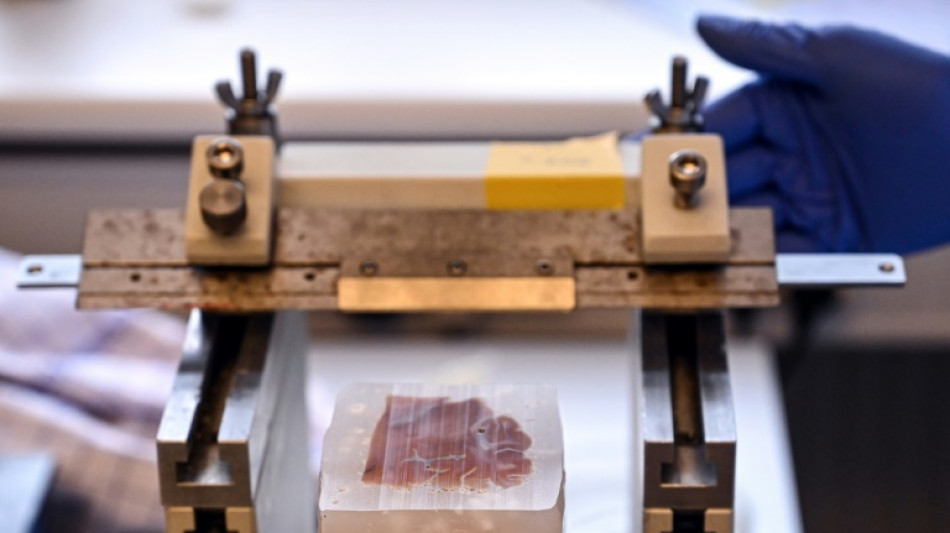
-
 Argentina govt launches account to debunk 'lies' about Milei
Argentina govt launches account to debunk 'lies' about Milei
-
Australia drug kingpin walks free after police informant scandal

-
 Dupont wants more after France sparkle and then wobble against Ireland
Dupont wants more after France sparkle and then wobble against Ireland
-
Cuba says willing to talk to US, 'without pressure'

-
 NFL names 49ers to face Rams in Aussie regular-season debut
NFL names 49ers to face Rams in Aussie regular-season debut
-
Bielle-Biarrey sparkles as rampant France beat Ireland in Six Nations

-
 Flame arrives in Milan for Winter Olympics ceremony
Flame arrives in Milan for Winter Olympics ceremony
-
Olympic big air champion Su survives scare

-
 89 kidnapped Nigerian Christians released
89 kidnapped Nigerian Christians released
-
Cuba willing to talk to US, 'without pressure'

-
 Famine spreading in Sudan's Darfur, UN-backed experts warn
Famine spreading in Sudan's Darfur, UN-backed experts warn
-
2026 Winter Olympics flame arrives in Milan

-
 Congo-Brazzaville's veteran president declares re-election run
Congo-Brazzaville's veteran president declares re-election run
-
Olympic snowboard star Chloe Kim proud to represent 'diverse' USA

-
 Iran filmmaker Panahi fears Iranians' interests will be 'sacrificed' in US talks
Iran filmmaker Panahi fears Iranians' interests will be 'sacrificed' in US talks
-
Leicester at risk of relegation after six-point deduction

-
 Deadly storm sparks floods in Spain, raises calls to postpone Portugal vote
Deadly storm sparks floods in Spain, raises calls to postpone Portugal vote
-
Trump urges new nuclear treaty after Russia agreement ends

-
 'Burned in their houses': Nigerians recount horror of massacre
'Burned in their houses': Nigerians recount horror of massacre
-
Carney scraps Canada EV sales mandate, affirms auto sector's future is electric

-
 Emotional reunions, dashed hopes as Ukraine soldiers released
Emotional reunions, dashed hopes as Ukraine soldiers released
-
Bad Bunny promises to bring Puerto Rican culture to Super Bowl

-
 Venezuela amnesty bill excludes gross rights abuses under Chavez, Maduro
Venezuela amnesty bill excludes gross rights abuses under Chavez, Maduro
-
Lower pollution during Covid boosted methane: study

-
 Doping chiefs vow to look into Olympic ski jumping 'penis injection' claims
Doping chiefs vow to look into Olympic ski jumping 'penis injection' claims
-
England's Feyi-Waboso in injury scare ahead of Six Nations opener

-
 EU defends Spain after Telegram founder criticism
EU defends Spain after Telegram founder criticism
-
Novo Nordisk vows legal action to protect Wegovy pill

-
 Swiss rivalry is fun -- until Games start, says Odermatt
Swiss rivalry is fun -- until Games start, says Odermatt
-
Canadian snowboarder McMorris eyes slopestyle after crash at Olympics

-
 Deadly storm sparks floods in Spain, disrupts Portugal vote
Deadly storm sparks floods in Spain, disrupts Portugal vote
-
Ukrainian flag bearer proud to show his country is still standing

-
 Carney scraps Canada EV sales mandate
Carney scraps Canada EV sales mandate
-
Morocco says evacuated 140,000 people due to severe weather

-
 Spurs boss Frank says Romero outburst 'dealt with internally'
Spurs boss Frank says Romero outburst 'dealt with internally'
-
Giannis suitors make deals as NBA trade deadline nears

-
 Carrick stresses significance of Munich air disaster to Man Utd history
Carrick stresses significance of Munich air disaster to Man Utd history
-
Record January window for transfers despite drop in spending

-
 'Burned inside their houses': Nigerians recount horror of massacre
'Burned inside their houses': Nigerians recount horror of massacre
-
Iran, US prepare for Oman talks after deadly protest crackdown

-
 Winter Olympics opening ceremony nears as virus disrupts ice hockey
Winter Olympics opening ceremony nears as virus disrupts ice hockey
-
Mining giant Rio Tinto abandons Glencore merger bid

-
 Davos forum opens probe into CEO Brende's Epstein links
Davos forum opens probe into CEO Brende's Epstein links
-
ECB warns of stronger euro impact, holds rates

-
 Famine spreading in Sudan's Darfur, warn UN-backed experts
Famine spreading in Sudan's Darfur, warn UN-backed experts
-
Lights back on in eastern Cuba after widespread blackout

-
 Russia, US agree to resume military contacts at Ukraine talks
Russia, US agree to resume military contacts at Ukraine talks
-
Greece aims to cut queues at ancient sites with new portal

-
 No time frame to get Palmer in 'perfect' shape - Rosenior
No time frame to get Palmer in 'perfect' shape - Rosenior
-
Stocks fall as tech valuation fears stoke volatility


Grey area: chilling past of world's biggest brain collection
Countless shelves line the walls of a basement at Denmark's University of Odense, holding what is thought to be the world's largest collection of brains.
There are 9,479 of the organs, all removed from the corpses of mental health patients over the course of four decades until the 1980s.
Preserved in formalin in large white buckets labelled with numbers, the collection was the life's work of prominent Danish psychiatrist Erik Stromgren.
Begun in 1945, it was a "kind of experimental research," Jesper Vaczy Kragh, an expert in the history of psychiatry, explained to AFP.
Stromgren and his colleagues believed "maybe they could find out something about where mental illnesses were localised, or they thought they might find the answers in those brains".
The brains were collected after autopsies had been conducted on the bodies of people committed to psychiatric institutes across Denmark.
Neither the deceased nor their families were ever asked permission.
"These were state mental hospitals and there were no people from the outside who were asking questions about what went on in these state institutions," he said.
At the time, patients' rights were not a primary concern.
On the contrary, society believed it needed to be protected from these people, the researcher from the University of Copenhagen said.
Between 1929 and 1967, the law required people committed to mental institutions to be sterilised.
Up until 1989, they had to get a special exemption in order to be allowed to marry.
Denmark considered "mentally ill" people, as they were called at the time, "a burden to society (and believed that) if we let them have children, if we let them loose... they will cause all kinds of trouble," Vaczy Kragh said.
Back then, every Dane who died was autopsied, said pathologist Martin Wirenfeldt Nielsen, the director of the collection.
"It was just part of the culture back then, an autopsy was just another hospital procedure," Nielsen said.
The evolution of post-mortem procedures and growing awareness of patients' rights heralded the end of new additions to the collection in 1982.
A long and heated debate then ensued on what to do with it.
Denmark's state ethics council ultimately ruled it should be preserved and used for scientific research.
- Unlocking hidden secrets -
The collection, long housed in Aarhus in western Denmark, was moved to Odense in 2018.
Research on the collection has over the years covered a wide range of illnesses, including dementia, schizophrenia, bipolar disorder and depression.
"The debate has basically settled down, and (now people) say 'okay, this is very impressive and useful scientific research if you want to know more about mental disease'," the collection's director said.
Some of the brains belonged to people who suffered from both mental health issues and brain illnesses.
"Because many of these patients were admitted for maybe half their life, or even their entire life, they would also have had other brain diseases, such as a stroke, epilepsy or brain tumours," he added.
Four research projects are currently using the collection.
"If it's not used, it does no good," says the former head of the country's mental health association, Knud Kristensen.
"Now we have it, we should actually use it," he said, complaining about a lack of resources to fund research.
Neurobiologist Susana Aznar, a Parkinson's expert working at a Copenhagen research hospital, is using the collection as part of her team's research project.
She said the brains were unique in that they enable scientists to see the effects of modern treatments.
"They were not treated with the treatments that we have now," she said.
The brains of patients nowadays may have been altered by the treatments they have received.
When Aznar's team compares these with the brains from the collection, "we can see whether these changes could be associated with the treatments," she said.
S.Abdullah--SF-PST



